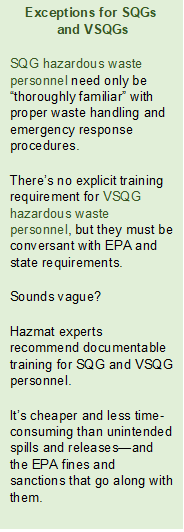Hazardous Waste Management Annual Training Requirements
March 22, 2022
Three-year refresher courses for your employees are generally the rule across the various federal and state agencies that regulate hazardous waste management, storage, transport, and disposal. But once-a-year trips to the classroom are mandated in certain circumstances, particularly for LQGs and HAZWOPER.
Large Quantity Generators (LGQs)
If you’re an LQG, then annual refresher courses are required. By way of review:
Specialized training is required for all LGQ hazardous waste personnel within six months of bringing them onboard.
The EPA defines “hazardous waste personnel” as anyone on your staff whose actions—or inactions—might result in noncompliance with applicable RCRA regulations.
Put another way: it’s anybody and everybody involved in selecting, marking, labeling, inspecting, moving, or otherwise handling your hazardous waste containers.
Also note: all staff who deal with your hazardous waste must be adequately trained, either daily or incidentally—not just your emergency responders.
If Courtney in Accounting occasionally rolls up her sleeves to help toss around a few barrels of hazmat, she might be considered a hazardous waste personnel, especially if she’s somehow involved in “reading and applying” federal and/or state hazardous waste regulations.
Also bear in mind that such training is required of any outside contractors who might assist you with onsite hazardous waste management—or who might incidentally produce hazardous waste on your site (such as painters, repair companies, or renovators).
Exceptions for newbies. New hires can work under the direct supervision of a trained person for up to six months. Ditto for contractors: their employees can assist with your hazmat management if directly supervised by a trained person—but only once, and for a period less than six months.
HAZWOPER training
Although it might sound like a toxic hamburger, HAZWOPER is the acronym for Hazardous Waste Operations and Emergency Response, which is a set of guidelines produced and maintained by the OSHA to regulate workplace hazardous waste management and emergency services.
HAZWOPER certification is mandatory for employees who must drive onto hazardous waste sites, enter EPA-regulated treatment/storage/disposal facilities, or respond to hazardous waste emergencies; and eight-hour refresher courses are required annually.
Your state’s training requirements might differ from that of the EPA
In matters of hazardous waste disposal, the face of the EPA is likely that of your state—not the federal government. This is because the 1976 Resource Conservation and Recovery Act (RCRA) directs the EPA to delegate primary responsibility for implementing federal hazardous waste regulations to the individual states.
Per the RCRA, states must fulfill this mandate with programs that are consistent with federal regulations—and at least equally stringent.
Thereby, individual states have the power to adopt hazardous waste management regulations that are more stringent than those of the federal government—and a number of them have done so. So it’s not inconceivable that some state or local entity requires annual (as opposed to triennial) training where the federal government doesn’t.
The upshot
As they tend to come from more than one government bureaucracy at haphazard intervals, environmental regulations are plentiful, evolving, and challenging to track. Ignoring or misunderstanding them can subject you to pecuniary and even criminal consequences.
Poor employee training is one of the most frequently cited EPA violations. And RCRA civil penalties start at $20,528 per day and go as high as $102,638 per day. But don’t take our word for it. Look here.
In sum, it’s crucial to get expert advice. If you need help ensuring your company is meeting necessary training requirements, we can help. Call (425) 414-3485 today or fill out this form to get started.

